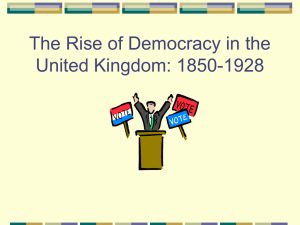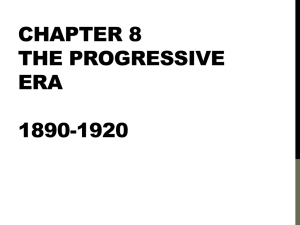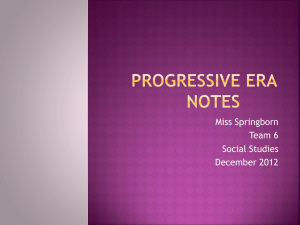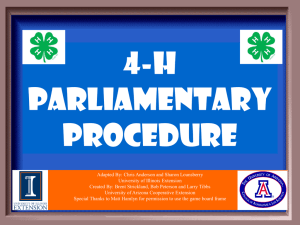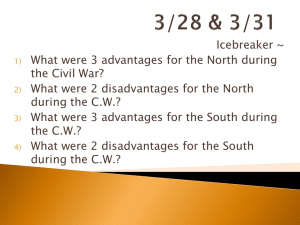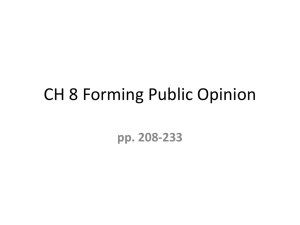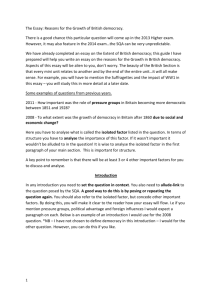3. Why did democracy grow
advertisement
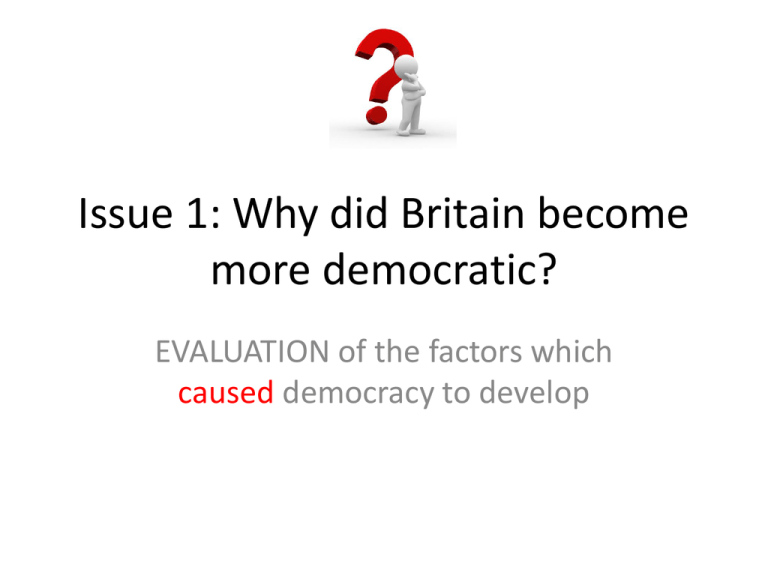
Issue 1: Why did Britain become more democratic? EVALUATION of the factors which caused democracy to develop More than one factor: Pressure Groups Social & Economic change Political advantage Changing political attitudes Examples set by other countries Effects of WWI 1. Pressure groups as a cause National Reform Union 1864 – promoted unity between middle and working classes Reform League 1864 – more RADICAL campaigned for universal suffrage along with Chartists, Trade unionists and socialists Demonstrations – eg. John Bright organised large public meetings NUWSS WSPU • The 1860s marked a time of revolutionary spirit. The above groups played an important role in supporting the extension of franchise in the 2nd Reform Act, 1867. 1866, Hyde Park riots caused alarm HISTORIOGRAPHY – How far were pressure groups a key cause? YES • Roydon Harrison – Trade depression and unemployment created a volatile mood. Artisans (skilled workers) became more respectable. • Hyde Park riots of July 1866 all pressurised government in light of 1867 Reform Act and sparked fear or revolution! NO • Other historians argue that there is no evidence that the law was changed as a result to pressure groups. • In fact, the new laws passed went beyond the demands of pressure groups. • They merely persuaded politicians that there was a NEED for reform. • Played no part in causing 1884 Reform Act. 2. Social & economic change as a cause Industrial Revolution Growing Urbanisation • Industrial revolution =HUGE CHANGE in: population demographic, urbanisation, class structures and the decline of landed aristocracy. • Working class wanted improved living/working conditions – urban cities gave them means to organise protest and trade unions increased. • Middle class argued they created wealth for the country so should have a say in government instead of lazy landowners. Urbanisation • Up until 1750 80% of the population worked in the countryside. However, industrialisation meant towns/cities grew and by 1850 50% of people lived in cities – 75% by 1900 • Urbanisation (rural to urban demographic change) resulted in a rapid spread of IDEAS. Railway networks aided communication of these ideas and helped political organisations run. Cheap daily newspapers contributed to the creation of political identity • Workers’ reputation as being too ‘stupid’ to vote changed as people became better educated (1870s Education Acts). HISTORIOGRAPHY • “Popular pressure had little effect on governments who had their own motives for reform….it can be argued that political advantage was at the heart of much of the change.” John Kerr ‘Dish the Whigs’ by ‘stealing the Liberals’ clothes’! 3. Political advantage as a cause • Disraeli and the Conservative Party thought they would gain support from the Working classes if they gave more people the vote. • This they did in 1867 when passing the 2nd Reform Act. • Disraeli had ‘stolen the Liberals’ clothes’, (i.e. taken their ideas) and had ‘dished’ them at the same time! HISTORIOGRAPHY • ‘ By limiting the amount of spending on elections, some Liberals believed the advantage held by wealthier Conservative opponents would be reduced. This made political reform an action based on the hope that reform would give an advantage to the party in power.’ –John A. Kerr and James McGonigle. Political Parties Attitudes • Liberal Party – • Leader William Gladstone saw the better off skilled working class as their natural supporters. • They had middle class values of hard work, education and moral values. • Called them the ‘respectable elite’. 11 • Conservatives – • Did not wish to give the vote to the working class yet their government passed the 1867 Reform Act (1868 in Scotland). Why? • Their leader Disraeli persuaded them that they could not ignore reform and to allow the Liberals to pass the reform act might alienate potential new voters • Disraeli convinced Conservative MPs that the working class would gratefully vote for the party that gave them the vote and would follow their ‘betters’ advice on what to vote for. 12 Changing attitudes of Political Parties • The Conservatives passed the 1867 Reform Act which gave the vote to 1 in 3 working men. They thought the new voters would gratefully support them. • Not to be outdone, the Liberal’s 1884 Reform Act doubled the amount of men able to vote to 2 in 3. It was an attempt to get support for the Liberal Party from the working class too. 13 Analysis • • • • At first political parties were against widening the franchise. But then both the Liberals and Conservatives saw advantages in doing so: They believed that the party who did give the working class the vote would be rewarded with their loyalty. For example, the skilled working class following 1867 voted Conservative and the unskilled following 1884 voted Liberal. It would also stop potential unrest from the working class demanding even greater democracy. Key point – outbidding each other led to more working class men having the vote and so greater democracy 14 4. Changing Political Attitudes “The times they are a’ changing” – Political reform was inevitable and no longer seen as a threat to the stability of the country. Democracy and Liberalism would be the building blocks of the new order. Why? • Elsewhere in Europe and USA, there were struggles taking place for liberty and Britain supported them so why not in their own country? USA became a republic and wrote their own constitution. France based their government on LIBERTY FRATERNITY EQUALITY • American Civil War (1862-65) – Artisans (skilled town workers) proved their education and conscience by supporting the ‘North’ (Unionists) and put pressure on the ‘South’ (Confederacy) by refusing to buy cotton from slave workers even if it meant a pay cut. • This convinced some politicians that workers deserved the vote. 5. Examples set by other countries Britain was the ‘Mother country’ in the British Empire . Before the outbreak of war in 1914 Australia and New Zealand had already granted the vote to women. By 1914 some American states had also granted the vote to women. Many politicians, particularly by 1918 didn’t want to portray the idea the country was living in the dark ages. 6. WWI • Women’s changing role in wartime justified change. • Fear of backlash of militant campaign if they didn’t reform. • Traditionalist historians believe that WWI greatly influenced the spread of democracy. • Traditionalists hold that some women gained the vote in 1918 because of the dangerous war work they committed themselves to. • Therefore the spread of democracy was a result of rewarding women for their role in munitions factories. Counter-argument • However, the traditionalists argument is weak, due to the fact that the women who worked in factories were typically under 30 years old. • Therefore, women’s war work did not lead to the enfranchisement of the women who participated in the war work and it cannot be said that WWI led directly to the spread of the vote to women. Group task • To what extent was popular pressure a major reason for the spread of democracy in Britain between 1851 and 1918? • Discuss which reason is more important in the spread of democracy: – – – – – – PRESSURE GROUPS URBANISATION & INDUSTRIALISATION CHANGING POLITICAL ATTITUDES POLITICAL ADVANTAGE EXAMPLES ABROAD WWI

